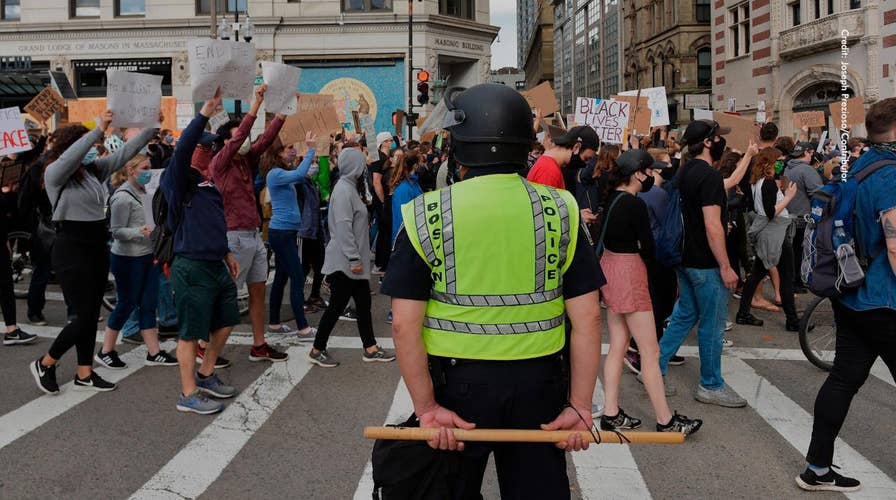Former FBI official on police reform bills: 'You can't really legislate' good police behavior
Senate and House Democrats have introduced sweeping police reform proposals in the wake of George Floyd’s death at the hands of a Minneapolis police officer.
Senate and House Democrats have introduced sweeping police reform proposals in the wake of George Floyd’s death while in the custody of a Minneapolis police officer.
During a news conference Monday, Speaker of the House Nancy Pelosi, D-Calif., said, “We cannot settle for anything less than a transformative structural change.”
Announced with the support of the Congressional Black Caucus, Sens. Cory Booker and Kamala Harris, the Justice in Policing Act of 2020 calls for a number of changes to how police at all levels conduct themselves.
The proposal includes banning chokeholds and no-knock warrants, reforming the legal precedent of “qualified immunity” for police and establishing a national database for use of force incidents, which would prevent fired officers from getting a job in another jurisdiction.
But some in the law enforcement community are skeptical that police behavior can be modified and corrected through legislation.
“Judgment is hard to legislate, and attitude, and professionalism, and all the things that go along with being a good police officer, you can’t really legislate that,” Christopher Swecker, a former assistant FBI director for the criminal division, told Fox News.
Swecker describes use of force as a “continuum,” starting from verbal commands to potentially lethal force, and says chokeholds are largely prohibited and against many police departments’ policies.
“It is permissible to defend your life or someone else’s life. … There really can’t be any type of lethal force off the table if you’re fighting for your life or someone else’s life,” said Swecker.
Holding police officers and police departments liable for their actions and how they respond to situations can be legally tricky as well. Qualified immunity is a court precedent in which officers are shielded from being sued for something that doesn’t violate a statutory or constitutional right. Currently, the law favors the government (i.e. police departments) when put before a court.
Reforming this precedent is a key component in the newly proposed legislation.
“I’d be more inclined to look at the liability situation as a deterrent. That would give them incentive to train their people better, hire their people more carefully, with more rigor and track them accordingly and give them more reason to fire that officer,” said Swecker.
Tuesday, Senate Majority Leader Mitch McConnell, R-Ky., announced he’s asked Sen. Tim Scott, R-S.C., to lead a group of GOP senators in drafting their own ideas for a police reform proposal to counter the Democrats.
Sen. Lindsay Graham echoed President Trump’s thinking to reporters today as well, saying, “He wants to do something. I talked to him a couple days ago. He believes there's common ground. We don't want to just look the other way.”
TRUMP TO ANNOUNCE LEGISLATIVE, EXECUTIVE ACTIONS ON POLICE REFORM: SOURCES
Democrats and Republicans alike are throwing cold water on the provocative slogans “Defund the Police" and “Abolish the police” that are running through progressive left-wing activist circles.
The statements aren't being taken literally by all, but more as a way to reorient funding for police departments and reestablish better safeguards to prevent the unnecessary use of lethal force from happening.
Presumptive Democratic nominee Joe Biden told CBS News in an interview that he didn’t support such a measure.
“No, I don't support defunding the police. ... I support conditioning federal aid to police, based on whether or not they meet certain basic standards of decency and honorableness. And, in fact, are able to demonstrate they can protect the community and everybody in the community,” Biden said.
Swecker, who has nearly 40 years of experience in criminal prosecutions and law enforcement, believes any legislation that cuts police department funding would be a non-starter.
DEFUND OR DISMANTLE THE POLICE: WHAT COULD IT MEAN?
“I’ve seen this before, abolish police department, severely cripple department’s budget, that is not the answer. Policing in general is out there to reduce crime and protect citizens," he said.

